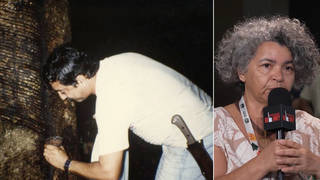
Topics
Over the past several weeks family farmers in the Klamath Basin on the Oregon-California border have been engagingin an unusual tactic: civil disobedience. On four separate occasions they have cracked open an irrigation headgate, and on Sunday, 100 farmers placed a pump in the Upper Klamath Lake and ran irrigation pipe 2 football fieldslong, sending water down the canal that has been dry since April.
That was when the U.S. Bureau of Reclamation shut off water supplying 90% of the land in the Klamath Project, tosave endangered sucker fish in Upper Klamath Lake and threatened coho salmon in the Klamath River.
Drought conditions mean there is not enough water for both fish and farmers. Since the water was shut off, farmershave been forced to sell off cattle, let pastures and hay fields go brown and give up annual plantings of potatoes,grain and other crops. Some farmers are facing bankruptcy and foreclosure.
The acts of disobedience have been largely symbolic, as many farmers’ crops are already dead. Sympatheticlaw-enforcement officials have declined to arrest anyone. But the situation escalated last week, when U.S.marshals came in for the first time to guard the irrigation project.
The media has painted the controversy as a battle between farmers and fish, livelihoods vs. the environment. Butboth fishermen and Native Americans have sided with the government’s decision to shut off the water. According tothe Pacific Coast Federation of Fishermen’s Associations (PCFFA), the Klamath River salmon runs have been reducedto less than 10% of their original size, and thousands of people have been put out of work. And the federal actionmarks the first time that Native Americans, who once depended on the fish for food, have won out over farmers onwater allocations since the irrigation system known as the Klamath Project opened in 1907.
Today we are going to have a discussion with three people: a farmer whose farm is at risk and who was one of theoriginal organizers of the acts of disobedience; the executive director of the Yurok tribe, and the NorthwestDirector for the Pacific Coast Federation of Fishermen’s Associations.
Guests:
- Mike Connelly, cattle and hay farmer, and member of the Klamath Watershed Council, the Klamath BasinEcosystem Foundation, and the Cloverleaf Stewardship Group.
- Glen Spain, Northwest Director for the Pacific Coast Federation of Fishermen’s Associations (PCFFA) andrepresentative of the Downriver Commercial Fishing Industry.
- Troy Fletcher, member and Executive Director of the Yurok Tribe.
Related links:











Media Options